A biological survey of forests slated for destruction for a palm oil project in Cameroon has uncovered 23 species of large mammals, including the world’s most endangered chimpanzee subspecies, the Nigeria-Cameroon chimpanzee (Pan troglodytes ellioti). The project in question, operated by U.S.-based company Herakles Farms, has come under stiff criticism both locally and abroad for threatening one of Africa’s most biologically rich forest lands and arguably undercutting local peoples’ access to traditional lands.
“These results show clearly that the planned concession area is of high conservation value. They also show that previous surveys were insufficient to establish adequate information on large mammal presence,” a survey report reads. These intensive surveys–supported by Save Wildlife Conservation Fund, Greenpeace, WWF, and Dschang University–have also found evidence of chimp nests in the concession area.
“Some parts could even act as a chimp sanctuary,” notes Kadiri Serge Bobo with Dschang University.
Only around 3,500 Nigeria-Cameroon chimps are believed to be found in the wild.
In addition to chimpanzees, surveyors also found forest elephants, which have decimated across their range by poachers; drill monkeys (Mandrillus leucophaeus), listed as Endangered by the IUCN Red List; Preuss’s red colobus monkey (Procolobus preussi), considered Critically Endangered; and red-capped mangabey (Cercocebus torquatus), considered Vulnerable. Surveyors also recorded four different duiker species.
 Chimpanzee hanging in a tree, Mefou, National Park, Cameroon. Photo by: Greeenpeace/Filip Verbelen. |
The survey also looked at freshwater fish in the region and found a number of rare species, including one that may be entirely new to science. A bird survey of the area is still ongoing.
Herkales Farms currently plans to build a 70,000 hectare palm oil plantation in the forest, which abuts four protected areas, including Korup National Park. In the past the company has claimed that it will be proactive on environmental concerns, including not cutting high conservation value forest (HCVF) and working with the local community to undercut the current bushmeat trade in the region. However, with more evidence it appears that much of the area in question is actually high conservation value. Conservationists also point to the fact that in Southeast Asia palm oil plantations have worsened poaching, not lessened it. In addition, aerial surveys have revealed that 89 percent of Herkales Farms’ concession is in forest areas.
The company has also come into conflict with local communities, which are reportedly split on whether or not the company will make good on promises to improve life in an extremely poor region. However, many locals have expressed concern over handing over traditional lands to a foreign company with a 99-year lease. Protests against Herakles have led to several arrests and claims of beatings and activists being held without charges.
In 2012, Herkales Farms abandoned seeking certification from the Roundtable on Sustainable Palm Oil (RSPO), which provides guidelines for sustainable palm oil production, after several NGOs lodged complaints.
“The US government has invested heavily in the conservation of the endangered [Nigeria-Cameroon chimpanzee] one of our closest relatives,” said Rolf Skar, Forests Campaign Director with Greenpeace. “It is therefore both ironic and tragic that Herakles Farms, an American company, is set to bulldoze forest that’s critical to the survival of these chimpanzees.”

Image of a nest made by a chimpanzee in the Nguti forest near New Konye. Recent field research carried out by Greenpeace also found evidence of chimpanzee nests, including this one, in the proposed Herakles Farm plantation zone. Photo: © Greenpeace/Jan-Jospeh Stok.

Forest and river in Herakles’ concession area. Photo: © Greenpeace/Alex Yallop.

Red Capped Mangabeys in forest, Mefou National Park, Cameroon. Photo: © Greenpeace/Filip Verbelen.

A man wears a t-shirt protesting against Herakles Farms plans to create a large palm oil plantation in Southwest Region, Cameroon. The shirt reads ‘No Plantation on Our Land, Herakles Farms (SGSOC) Out!’ Photo: © Greenpeace/Jean-Pierre Kepseu.

Oil palm nursery in a Herakles Farm’s concession area. Last year Herakles Farms said it had permission to set up three nurseries covering 100 hectares even before producing a Social and Environmental Impact Assessment (SEIA). Photo: © Greenpeace/Alex Yallop.
Related articles
Activists warn of industrial palm oil expansion in Congo rainforest
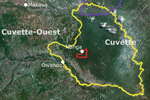
(02/21/2013) Industrial oil palm plantations are spreading from Malaysia and Indonesia to the Congo raising fears about deforestation and social conflict. A new report by The Rainforest Foundation UK (RFUK), dramatically entitled The Seeds of Destruction, announces that new palm oil plantations in the Congo rainforest will soon increase fivefold to half a million hectares, an area nearly the size of Delaware. But conservationists warn that by ignoring the lessons of palm oil in Southeast Asia, this trend could be disastrous for the region’s forests, wildlife, and people.
Controversial palm oil project concession in Cameroon is 89 percent ‘dense natural forest’
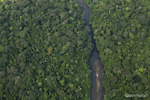
(02/21/2013) Satellite mapping and aerial surveys have revealed that a controversial palm oil concession in Cameroon is almost entirely covered by “dense natural forest,” according to a new report by Greenpeace. The activist group alleges that the concession, owned by Herakles Farms, is under 89 percent forest cover. The U.S.-based corporation intends to build a 70,000 hectare palm oil plantation in a region surrounded by four protected areas, including Korup National Park, but has faced stiff criticism from numerous environmental groups as well as conflict with locals.
Investors beware: global land grabbing ends in ‘financial damage’ and human rights violations

(02/07/2013) Investing in companies that flout local community rights in developing countries often leads to severe economic losses, according to a new report from the Rights and Resources Initiative (RRI). A rising trend in “land grabbing” from Africa to South America by corporations and even foreign governments results in social instability, which can lead to large-scale protests, violence, and even murder, delaying and sometimes derailing projects. Such instability poses massive risk to any investor, not to mention supporting corporate entities that are accused of ignoring human rights.
Photos reveal destruction of Cameroon rainforest for palm oil
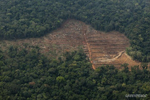
(11/26/2012) Newly released photos by Greenpeace show the dramatic destruction of tropical forest in Cameroon for an oil palm plantation operated by SG Sustainable Oils Cameroon (SGSOC), a subsidiary of the U.S. company Herakles Farm. The agriculture company is planning to convert 73,000 hectares to palm oil plantations on the edge of several protected areas, but has faced considerable opposition from environmentalists and some local communities. In addition to the aerial photos, Greenpeace alleges that ongoing forest clearing by Herakles is illegal since the companies 99-year lease has yet to be fully approved by the Cameroonian government.
Activists protesting controversial Cameroon palm plantation arrested
(11/17/2012) Activists protesting conversion of rainforest to an oil palm plantation have been arrested in Cameroon, reports Greenpeace.
Palm oil company in Cameroon drops bid for eco-certification of controversial plantation
(09/05/2012) Herakles Farm, a U.S.-based agricultural developer, will no longer seek eco-certification of its 70,000-hectare oil palm plantation in Cameroon, reports the Roundtable on Sustainable Palm Oil (RSPO). The move comes amid criticism from environmental groups that Herakles is converting high conservation value rainforest for the plantation.
Scientists say massive palm oil plantation will “cut the heart out” of Cameroon’s rainforest
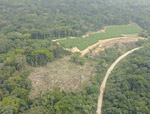
(03/15/2012) Eleven top scientists have slammed a proposed palm oil plantation in a Cameroonian rainforest surrounded by five protected areas. In an open letter, the researchers allege that Herakles Farm, which proposes the 70,000 hectare plantation in southwest Cameroon, has misled the government about the state of the forest to be cleared and has violated rules set by the Roundtable on Sustainable Palm Oil (RSPO), of which it’s a member. The scientists, many of whom are considered leaders in their field, argue that the plantation will destroy rich forests, imperil endangered species, and sow conflict with local people.
Palm oil, poverty, and conservation collide in Cameroon
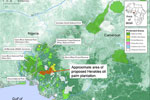
(09/13/2011) Industrial palm oil production is coming to Africa, its ancestral home. And like other places where expansion has occurred rapidly, the crop is spurring hope for economic development while generating controversy over its potential impacts. The world’s most productive oil seed has been a boon to southeast Asian economies, but the looming arrival of industrial plantations in Africa is raising fears that some of the same detriments that have plagued leading producers Malaysia and Indonesia—deforestation, greenhouse gas emissions, biodiversity loss, conflicts with local people, social displacement, and poor working conditions—could befall one of the world’s most destitute regions. While there is no question that oil palm is a highly lucrative crop that can contribute to economic development, there is also little doubt that conversion of native forests for plantations exacts a heavy toll on the environment. The apparent conflict seems to pit agroindustrial goliaths against greens, with communities falling somewhere in between. But Herakles, a New York-based investment firm planning to construct a 60,000-hectare plantation in the Central African country of Cameroon, says its approach will bridge this gap between economic development and the environment. Social and environmental campaigners are skeptical.







